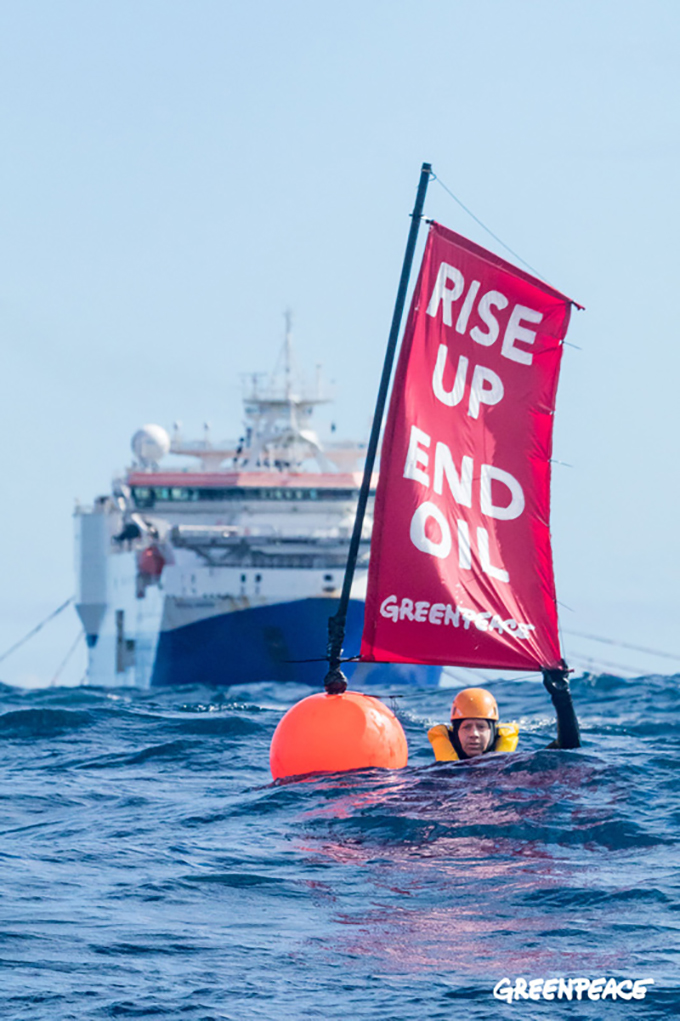
Three Greenpeace activists — including Greenpeace NZ executive director Russel Norman — today swam in front of the 125m Amazon Warrior, nicknamed “The Beast”.
The giant oil exploration ship is conducting offshore oil exploration off the New Zealand coast on behalf of Arctic driller Statoil and Chevron, a US oil company part-owned by President Donald Trump, reports Greenpeace News.
The swimmers’ position forced the Amazon Warrior to halt its operations and deviate off course.
They were 50 nautical miles off the Wairarapa coast when the action took place.
To find oil, the Amazon Warrior is using seismic cannons to blast the seafloor with soundwaves every eight seconds, day and night, reports Greenpeace News.
The ship needs to travel in straight lines along a grid to get data about potential oil reserves, and any deviation makes this data unusable.
The blasts the Amazon Warrior lets off are comparable in sound to an underwater volcano and can cause chronic distress to whales and dolphins in the area.
‘Extreme depths’ permits
Statoil and Chevron have permits to drill to extreme depths of up to three kilometres if oil is found – twice as deep as Deepwater Horizon in the Gulf of Mexico, which caused the world’s largest and most devastating oil spill in 2010.
The “fossil fuel” President, Donald Trump, has shares in Chevron, and the oil company funded a large part of his presidential inauguration.
Twenty five-year-old Sara is another of the swimmers who was floating in the path of the Amazon Warrior with Russel Norman.
She said she was putting her body “on the line” because the ship was searching for the very oil that would “destroy her future”.
“The science is settled that we can’t burn the majority of the fossil fuel reserves we know about if we want to keep the Earth’s temperature below dangerous levels,” she said, according to Greenpeace News.
“What this means is that not a single newly discovered oil well anywhere in the world can operate if we want to avoid a climate catastrophe. Right now I’m looking at a ship that’s been invited here by the New Zealand government to do just that.
“I’m young and I’m already experiencing the effects of climate change. Every year the storms get worse, the floods and the droughts are getting more extreme. Just imagine how grim my future looks if we can’t stop this.
‘People rising up’
“It’s easy to feel powerless because what we’re up against is so big. But everywhere, people are rising up and demanding change. Their actions are having a snowball effect, and in many parts of the world, we’re starting to see huge, positive changes.”
Greenpeace has been tailing the Amazon Warrior for the past two days in its newest boat, Taitu.
The organisation crowdfunded nearly $100,000 in just a week to buy the 15-metre boat, and ran an online competition to choose her name.
A 2013 Amendment to the Crown Minerals Act, dubbed the “Anadarko Amendment”, was put in place to stop protests at sea around oil exploration. The law change makes it an offence to interfere with or get closer than 500 metres of an offshore ship involved in oil exploration.
From on board Taitu, Greenpeace’s Dr Russel Norman, said the right to peaceful protest was essential to a healthy democracy and New Zealand had a long and proud tradition of protest at sea.
“Neither the government nor the oil industry can stifle people across New Zealand peacefully rising up against this mad pursuit of new oil to burn in the midst of what is nothing less than a climate emergency,” he said.
“Climate change threatens our homes, health and families. Despite knowing this, our Government is actively subsidising oil companies to look for new oil, putting profits above people’s lives – it has become necessary for people to take action.
‘Extreme storms’
“In New Zealand, we’ve already seen extreme storms, flooding, drought and fires in the space of a just a few weeks, and it’s only April. Climate change makes these weather events more frequent and more intense.”
Taitu’s trip follows on from a flotilla that included Ngāti Kahungunu’s voyaging waka, Te Matau a Māui, which travelled out to the Amazon Warrior to deliver a message on behalf of more than 80 hapū of Te Ikaroa.
Public opposition to oil exploration has seen protests in ports, petitions garnering tens of thousands of signatures, and significant local government and iwi opposition.
- Greenpeace NZ’s chief warns Amazon Warrior
- Greenpeace’s live feed from the Taitu
- New Greenpeace boat key to oil industry battle











































